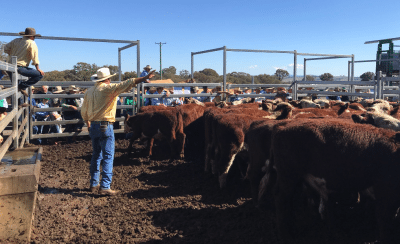THE number of cattle being sold through saleyards across south eastern saleyards has increased due to dry weather conditions.

Ben Emms from Ray White Emms Mooney selling Hereford weaner steers at a recent Carcoar sale – Image: CTLX Carcoar
Meat and Livestock Australia’s market intelligence manager, Scott Tolmie, said NSW was being particularly affected.
“Year-to-April total cattle being sold through saleyards is up 22 per cent compared to the same time last year,” Mr Tolmie said.
“This is being driven from places like the Central Tablelands, Dubbo and Gunnedah.”
He said the dry conditions were driving producers to de-stock and with the weather outlook not looking “overly positive” they were trying to get stocking rates right going in to winter.
Mr Tolmie said they looked at how the weather and lack of restocking demand was impacting on the trade steer indicator – they found prices for trade steers were down 13pc in NSW and 16pc in Victoria compared to 8pc in Queensland for the March quarter.
Hay flowing into Central Tablelands
Meanwhile, at Carcoar in the NSW Central Tablelands a fortnight ago, more than 11,200 cattle were yarded at the centre’s annual weaner sale – about 3000 more than the average for the sale due to the dry conditions.
Bowyer and Livermore director, Todd Clements, from Bathurst, said it has been the “driest autumn” he has seen in the Central Tablelands area in 15 years.
‘We are starting to get some people selling older breeders now’
“Everyone is starting to worry and we are starting to get some people selling older breeders now,” Mr Clements said.
He said even if it rained tomorrow, in the “cold country” no feed would grow from now through winter anyway.
“I was at the saleyards on Sunday and saw 15 trucks of hay go past, so it’s pretty ordinary.”
However, prices are holding up.
“There’s a few speculators buying some cattle and people from out of the district are buying,” Mr Clements said.
Record numbers at Dubbo
At Dubbo in the Central West, Paul Dakin of PT Lord Dakin & Associates said they have been yarding record numbers of cattle because of the weather.
“The number of store and fat (prime) cattle coming through is putting pressure on the system but that’s to be expected because there is no grass in paddocks,” Mr Dakin said.
“People are more educated now to sell rather than feed, unless they are set up for feeding,” he said.
Mr Dakin believed there are a lot of hard decisions to come.
“The price of fat (prime) cattle is relatively sound, but it comes back to the cost of production,” Mr Dakin said.
“Luckily there are patches of Queensland that are good and they are absorbing the restocking demand.”
Albury starting to feel the pinch
Further south, the situation isn’t as dire but producers are starting to “feel the pinch”, Schubert Boers livestock agent, Craig Schubert, from Albury, said.
“There isn’t a lot of paddock feed and we are getting closer to the cold weather and there won’t be much growth,” Mr Schubert said.
Even though there isn’t much rain forecast in the short term, Mr Schubert said numbers coming in to the saleyards in their region haven’t changed too much.
“I think a lot of people made decisions earlier as they aren’t prepared to feed indefinitely like in the past,” he said.
Mr Schubert said prices aren’t too bad, “all things considered” but light and younger stock are discounted because buyers are more selective.
Grass, water concerns in Gippsland
However, the Gippsland area of Victoria is experiencing higher volumes of cattle through saleyards.
Bill Wyndham & Co livestock agent, Colin Jones, Bairnsdale, said they yarded 4200 cattle at their store sale last Friday.
“It was a very big sale and bigger than normal because of the dry and we are running out of water here too,” Mr Jones said.
“We’ve had no good run-off rain for 12 months in Gippsland,” Mr Jones said.
With another sale in mid-May, Mr Jones said the numbers for that sale were increasing every day.
“It is worrying because of the time of year, even if it rains next week, we can’t grow grass overnight and once it does rain they’re worried it will become cold.”
